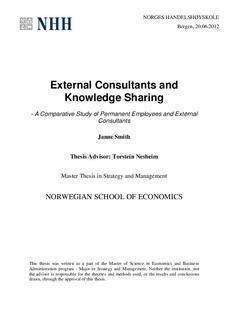External consultants and knowledge sharing : a comparative study of permanent employees and external consultants
Master thesis
Permanent lenke
http://hdl.handle.net/11250/169579Utgivelsesdato
2012Metadata
Vis full innførselSamlinger
- Master Thesis [4372]
Sammendrag
This empirical study is an examination of permanent employees and external consultants and the factors that affect their knowledge sharing behavior. It aims at answering the research question:
What factors enhance knowledge-sharing behavior of external consultants, in comparison with permanent employees?
A quantitative method is used to collect and analyze the empirical data, collected from the oil and gas industry in Norway, an industry with growing use of external consultants.
Past research on knowledge sharing has been conducted mainly on standard work relations. Thus, the theoretical framework and hypotheses are developed on this basis. Due to the nature of external consultancy work, the main hypothesis of this research is that external consultants are more reluctant to share knowledge. As employment contract is expected to influence an individual‘s attitudes and behavior, this study compares permanent employees and external consultants along several factors that may affect knowledge sharing behavior, namely: organizational support, integration, organizational commitment, trust, individual motivation, and job autonomy.
The results of this research found no significant difference in knowledge sharing behavior of permanent employees and external consultants, while organizational support, trust, and intrinsic motivation were found to be important factors enhancing knowledge sharing between employees. Results also show that external consultants are more extrinsically motivated and have a lower perception of job autonomy than permanent employees, which may have implications for individual initiative and accountability.
